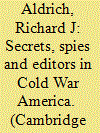| Srl | Item |
| 1 |
ID:
160227


|
|
|
|
|
| Summary/Abstract |
This analysis probes the interwoven careers and lives of two distinguished American diplomats, John Paton Davies, Jr. and George Frost Kennan. These Foreign Service officers, who rose to prominence in the years immediately after the Second World War, were embroiled in the formulation and implementation of controversial policy during the early Cold War. The experience of Davies and Kennan illustrates the domestic hazards that have dogged American foreign policy-making even into the present. Yet the focus here is on their friendship—a subject hitherto little examined in the scholarly literature—its connexion to the evolution of their policy recommendations, its steadying power in moments of moral and personal crisis, its tempering effect on failure. The assessment also draws on a notable work of fiction, Wallace Stegner’s 1987 Crossing to Safety, to consider the ineffable nature of friendship itself.
|
|
|
|
|
|
|
|
|
|
|
|
|
|
|
|
| 2 |
ID:
183523


|
|
|
|
|
| Summary/Abstract |
This essay considers secrets, spies and newspaper editors in the context of the Washington Post’s relationship with the CIA. The associated relationships and thoughts of Ben Bradlee, long-serving editor of the Washington Post and one of America’s most iconic journalists, are examined in detail. Bradlee spent much time reflecting on what the appropriate relationship between spies and the media should be and this is captured in his correspondence. This article argues that because the tensions between national security secrets and a free press were often negotiated informally though personal networks, this terrain is best analysed using ideas borrowed from social history. Editors were often wily mediators between Washington’s twin worlds of secrecy and publicity. It also suggests that in considering the CIA and the press, we need to give a little less attention to intrepid reporters and more attention to editors and owners who exercised more power. Overall, this realm is one of human relationships, best viewed not through the prism of policy documents, but through private papers or interviews.
|
|
|
|
|
|
|
|
|
|
|
|
|
|
|
|